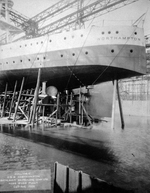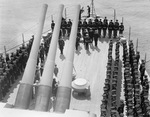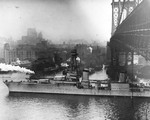Northampton
| Country | United States |
| Ship Class | Northampton-class Heavy Cruiser |
| Hull Number | CA-26 |
| Builder | Bethlehem Fore River Shipyard |
| Ordered | 18 Dec 1924 |
| Laid Down | 12 Apr 1928 |
| Launched | 5 Sep 1929 |
| Commissioned | 17 May 1930 |
| Sunk | 1 Dec 1942 |
| Displacement | 9,050 tons standard |
| Length | 600 feet |
| Beam | 66 feet |
| Draft | 16 feet |
| Machinery | 8 White-Forster boilers, 4 Parsons reduction steam turbines, 4 screws |
| Bunkerage | 1,400t fuel oil |
| Power Output | 107,000 shaft horsepower |
| Speed | 32 knots |
| Crew | 621 |
| Armament | As built: 3x3x8in/55, 4x5in/25, 6x21in torpedo tubes; 1941: 3x3x8in/55, 8×5in/25, 2x47mm saluting guns, 4x1.1 in/75 anti-aircraft guns |
| Armor | 3-3.75in belt, 1-2in deck, 1.5in barbettes, 0.75-2.5in turrets, 1.25in conning tower |
| Aircraft | 4 |
| Catapults | 2 |
Contributor: David Stubblebine
ww2dbaseThe Northampton-class heavy cruisers, with their sleek lines and clipper bows, had an appearance more like racing sloops than armed warships. Lead ship of her class, USS Northampton was laid down 12 Apr 1928 at the Bethlehem Steel Fore River Shipyard at Quincy, Massachusetts, United States. The Northampton-class ships were initially classified as light cruisers because of their light armor, according to the terms of the Washington Naval Treaty of 1922. Northampton was named for the Massachusetts home town of then President Calvin Coolidge and by the time of the ship's launching on 5 Sep 1929, the now former-first lady Grace Coolidge acted as sponsor. Northampton was commissioned 17 May 1930, Captain Walter N. Vernou commanding.
ww2dbaseFor her shakedown cruise, Northampton sailed to the Mediterranean and spent the next ten years participating in fleet exercises in the Caribbean, at the Panama Canal Zone, and in the Pacific. Northampton was redesignated as a heavy cruiser in 1931 based on her 8-inch main guns, according to the terms of the London Naval Treaty of 1930. She operated primarily in the Pacific from 1932, first homeported at San Pedro, California and later at Pearl Harbor, Hawaii.
ww2dbaseOn 7 Dec 1941, Northampton was at sea as part of the USS Enterprise task group, returning to Pearl Harbor the day after the Japanese attack. When Enterprise sailed two days later in search of the Japanese fleet, Northampton went with her. Northampton's first combat was 1 Feb 1942 when she and Salt Lake City shelled Japanese installations on Wotje in the Marshall Islands. Three weeks later, they made a similar bombardment against Wake Island and then again at Marcus Island.
ww2dbaseEarly in Apr 1942, Northampton sailed again as one of Enterprise's escorts and their group joined up with USS Hornet (Yorktown-class) north of Midway. They all then continued sailing west where Hornet launched the Doolittle Raiders. The ships replenished quickly at Pearl Harbor and then sailed for the Southwest Pacific, arriving just after the Battle of the Coral Sea. Returning to Pearl Harbor, Northampton again sailed with the Enterprise task group as they intercepted the Japanese fleet at Midway. The Battle of Midway was primarily one of naval aviation so Northampton's role, like all the escorting ships, was completely defensive; providing antiaircraft fire to protect the carriers.
ww2dbaseIn mid-Aug 1942, Northampton sailed again for the Southwest Pacific to join in the Guadalcanal operation. When Enterprise was bombed on 24 Aug 1942 and had to withdraw, Northampton shifted to the task group of the recently arrived USS Wasp (Wasp-class). On 15 Sep 1942, the task groups of Hornet and Wasp were operating together southeast of the Solomon Islands escorting a convoy of US Marine reinforcements when the force was attacked by Japanese submarine I-19 commanded by Lieutenant Commander Kinashi Takakazu. I-19 fired a single spread of six torpedoes that hit three different ships. Wasp was mortally wounded by two torpedoes while battleship North Carolina and destroyer O'Brien were also damaged (O'Brien was only 800 yards off Northampton's port beam when that torpedo struck). Fires raged on Wasp fueled by aviation gasoline and could not be controlled. The carrier was later abandoned then scuttled with five torpedoes from the destroyer USS Lansdowne.
ww2dbaseShifting to the USS Hornet task group, Northampton screened the carrier on an attack against Bougainville in the Solomons on 5 Oct 1942. Three weeks later, it was Hornet that was mortally wounded. In the Battle of Santa Cruz Islands, where enemy ships never came within sight of each other, Northampton and other ships provided intense antiaircraft fire to protect Hornet from attacking airplanes, but the carrier was bombed heavily and was badly damaged. Northampton attempted to take Hornet in tow but the ship was obviously doomed. Hornet had to be abandoned and was later sunk by a combination of American efforts to scuttle the ship and, finally, Japanese torpedo fire.
ww2dbaseThen through Nov 1942, Northampton operated to prevent the Japanese from provisioning their troops on Guadalcanal. This meant night patrols in "The Slot." In the dead of night on 30 Nov 1942, Northampton, along with four other cruisers and six destroyers, engaged a Japanese destroyer transport force in the Battle of Tassafaronga north of Guadalcanal (also called the Fourth Battle of Savo). Cruisers Minneapolis and New Orleans took torpedo hits within a minute of each other and then 10 minutes later, Pensacola was hit. All three had to withdraw, taking two destroyers as escorts. Cruisers Northampton and Honolulu, with the four remaining destroyers, continued the fierce action and scored many hits on the Japanese ships. Close to the end of the engagement, Northampton was struck by two torpedoes which tore a huge hole in her port side aft and ripped away decks and bulkheads. Taking on water rapidly, she began to list and settle by the stern but remained afloat. After three hours, however, it was clear Northampton could not be saved and she had to be abandoned. With great discipline and order, Northampton was abandoned with destroyers Drayton and Fletcher taking on 870 of her survivors in less than an hour. Northampton then gently rolled over and sank - becoming the last capital ship to litter the floor of Iron Bottom Sound.
ww2dbaseDespite just under a year of wartime service, Northampton received six World War II Battle Stars.
ww2dbaseSources:
United States Navy
United States National Archives
NavSource Naval History
Valka's Pacific Fleet Directory
CombinedFleet.com
Wikipedia
Last Major Revision: Aug 2020
Heavy Cruiser Northampton (CA-26) Interactive Map
Photographs
 |  |  |  |
Maps
 |
Northampton Operational Timeline
| 18 Dec 1924 | The order for the construction of cruiser Northampton was issued. |
| 12 Apr 1928 | The keel of Northampton was laid down at the Bethlehem Fore River Shipyard in Quincy, Massachusetts, United States. |
| 5 Sep 1929 | Northampton was launched at the Bethlehem Fore River Shipyard in Quincy, Massachusetts, United States. |
| 17 May 1930 | Cruiser USS Northampton was commissioned at the Bethlehem Fore River Shipyard, Quincy, Massachusetts, United States with Captain Walter N. Vernou in command. |
| 6 Sep 1940 | A German paratrooper dressed in civilian clothes with a Swedish passport was dropped in Northamptonshire, England, United Kingdom at 0300 hours to report damage to airfields; he was injured upon landing and would be captured at 1720 hours. At 0900, 1300, and 1800 hours, German bombers flew up the Thames Estuary and bombed RAF airfields at Heston, Kenley, and Biggin Hill, as well as the Hawker factories at Brooklands (only minor damage) and the oil storage tanks at Thameshaven (caused large fires). The Germans lost 37 fighters and 7 bombers on this day, while the British lost 22 fighters. Overnight, German bombers attacked London. |
| 6 Dec 1941 | USS Enterprise and her task group (Enterprise, Northampton, Chester, Salt Lake City, Balch, Maury, Craven, Gridley, McCall, Dunlap, Benham, Fanning, & Ellet) encountered heavy weather which delayed the refueling operation for destroyers and delayed the group's arrival at Pearl Harbor. |
| 14 Dec 1941 | Cruiser USS Northampton and destroyer USS Craven are damaged due to heavy seas during an attempted refueling north of Oahu, Hawaii. |
| 16 Dec 1941 | USS Enterprise task force returned to Pearl Harbor, US Territory of Hawaii after failing to find the Japanese Pearl Harbor attack force. |
| 11 Jan 1942 | USS Enterprise and Task Force 8 departed from Pearl Harbor to escort transports of US Marines to American Samoa. |
| 1 Feb 1942 | The United States launched its first air offensive against the Marshall Islands as SBD and TBD aircraft from carriers USS Yorktown and USS Enterprise struck Japanese bases in the island group. Cruisers USS Northampton, USS Chester, and USS Salt Lake City also bombarded atolls in the Marshall Islands, sinking gunboat Toyotsu Maru and transport Bordeaux Maru and damaging cruiser Katori, submarine I-23, submarine depot ship Yasukuni Maru, minelayer Tokiwa, and several others. Vice Admiral Mitsumi Shimizu was wounded aboard Katori. USS Chester sustained damage from a Japanese dive bomber during the attack; 8 were killed, 21 were wounded. |
| 5 Feb 1942 | USS Enterprise and Task Force 8 arrived at Pearl Harbor, US Territory of Hawaii. |
| 24 Feb 1942 | USS Enterprise launched aircraft to attack Wake Island. Cruisers USS Salt Lake City and USS Northampton shelled Wake Island. |
| 4 Mar 1942 | USS Enterprise launched aircraft against Marcus Island. Cruisers USS Salt Lake City and USS Northampton shelled Marcus Island. |
| 8 Apr 1942 | USS Enterprise and Task Force 16 departed Pearl Harbor, US Territory of Hawaii to make rendezvous with USS Hornet, which was en route to strike the Japanese home islands. |
| 13 Apr 1942 | Task Force 16 (USS Enterprise) made rendezvous with Task Force 18 (USS Hornet) north of Midway and pressed on westward toward the launch point for the Doolittle Raid. Later on the same day, they crossed the 180th meridian. |
| 28 May 1942 | USS Enterprise and Task Force 16 departed Pearl Harbor, US Territory of Hawaii for Midway Atoll. |
| 17 Aug 1942 | USS Hornet and Task Force 17 departed Pearl Harbor, US Territory of Hawaii for the South Pacific. |
| 5 Oct 1942 | Task Force 17 (USS Hornet, Northampton, Pensacola, Juneau, San Diego, 3 destroyers) struck Japanese installations around the southern end of Bougainville in the Solomon Islands (Buin-Faisi-Tonolai Raid). |
| 30 Nov 1942 | Near Guadalcanal, Solomon Islands, a formation of US cruisers sailing from Espiritu Santo ambushed a nighttime fast destroyer convoy led personally by Rear Admiral Raizo Tanaka south of Savo Island in the Solomons. Tanaka's quick thinking led to a Japanese victory in the Battle of Tassafaronga. Cruisers USS Northampton, USS Pensacola, USS Minneapolis, and USS New Orleans (New Orleans-class) were badly damaged by torpedoes. Cruiser USS Northampton was sunk by Type 93 torpedoes launched by Japanese destroyer Oyashio. Light cruiser USS Honolulu reported gunfire hits (along with other ships) on Japanese destroyer Takanami which broke apart and sank. |
| 1 Dec 1942 | at 0303 hours (local time): Badly damaged by two torpedo hits in the Battle of Tassafaronga, cruiser USS Northampton sank in Iron Bottom Sound north of Guadalcanal, Solomon Islands. Destroyers Drayton and Fletcher took on 870 of her survivors in less than an hour. |
Please consider supporting us on Patreon. Even $1 per month will go a long way! Thank you. Please help us spread the word: Stay updated with WW2DB: |
» Doolittle Raid
» Battle of Midway and the Aleutian Islands
» Guadalcanal Campaign
 |
- » 1,167 biographies
- » 337 events
- » 44,617 timeline entries
- » 1,244 ships
- » 350 aircraft models
- » 207 vehicle models
- » 376 weapon models
- » 123 historical documents
- » 261 facilities
- » 470 book reviews
- » 28,520 photos
- » 365 maps
Captain Henry P. Jim Crowe, Guadalcanal, 13 Jan 1943
Please consider supporting us on Patreon. Even $1 a month will go a long way. Thank you!
Or, please support us by purchasing some WW2DB merchandise at TeeSpring, Thank you!